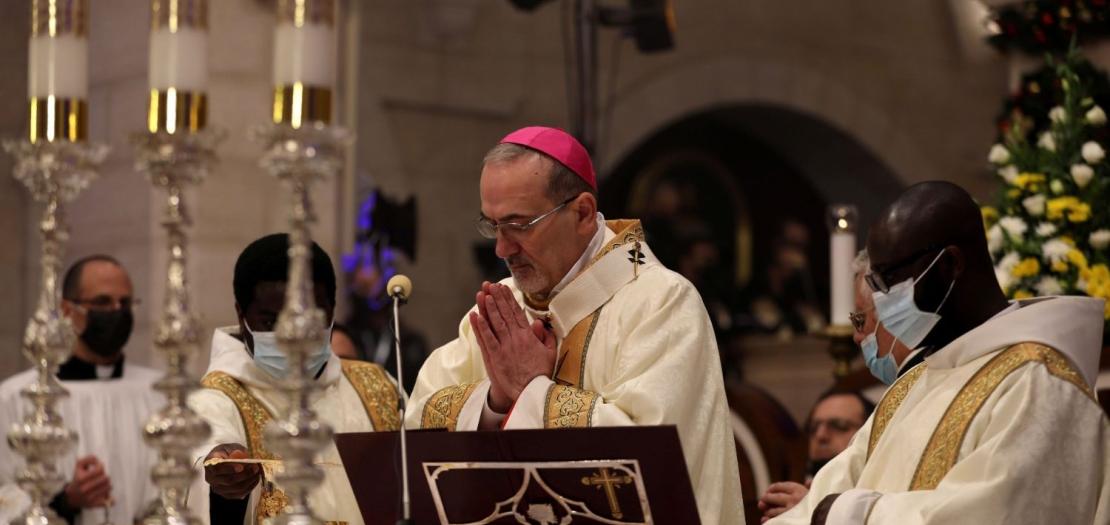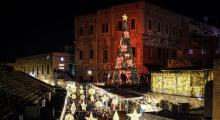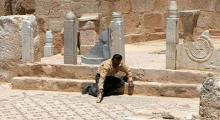Issued by the Catholic Center for Studies and Media - Jordan. Editor-in-chief Fr. Rif'at Bader - موقع أبونا abouna.org

Following is the text of the meditation by His Beatitude Cardinal Pierbattista Pizzaballa, Latin Patriarch of Jerusalem, for the second Sunday of Lent B, dated February 25, 2024:
Today's Gospel passage gives us to take an important step in our Lenten journey.
Last Sunday, the story of the temptations brought light inside our lives, where the Word of the Father wants to come down to knead with our everyday choices.
Today, the same light shines on the face of Jesus, revealing something of the mystery of God for us to know as much as we can.
The account of the Transfiguration (Mark 9:2-10) takes us back to the beginning of our faith journey, to what makes it possible.
And that is to the fact that we can believe by the simple fact that God reveals himself, that he makes himself known, that he shows us his Face.
For immemorial time, in salvation history, God has been walking with his people and revealing himself through his works and his Word. He is not a God who runs things from afar, who prefers to remain in the shadows, but He is someone who loves to make Himself known, and for this reason He enters the history with a way and a Face which ask to be known.
In addition, sometimes along the way, there are privileged moments when he calls someone to the background, usually on a mountain, and gives him a deeper and more intimate experience of His presence.
For immemorial time, then, God has been revealing himself, making himself known, and Jesus is not different from the Father.
He goes up a mountain, together with three of His disciples, (Mark 9:2) and there He makes Himself known in all His beauty and splendor as the Son.
In fact, it is not He who reveals Himself, but it is the Father who reveals Jesus to us. (Mark 9:7) For all along the journey of Jesus' life, it is clear that Jesus did not come to tell us so much about Himself as about His Father, about the beauty of being the beloved Son.
And so the Father does not reveal himself either, but he reveals the Son to us, desiring us to know him, to welcome him as a brother in our lives.
So Lent comes to tell us this: God, who always reveals himself, wants to do so in a new way, in a definitive way. And this revelation will be Easter, where the Son will reveal the Father by trusting Him totally, and the Father will reveal the Son by giving Him back his life and resurrecting Him.
It is no accident, then, that on the mount of transfiguration are Moses and Elijah.
For Moses and Elijah are, in salvation history, the two greatest witnesses that God reveals Himself.
They, too, went up a mountain one day and came to know God more closely, (Ex 19.33.34,1Kings19) and they began to understand precisely something that has a close connection with Jesus' Passover.
Moses, on the mountain, came to know that God's name is mercy, that he is slow to anger, that he forgives the guilt of his people, that he does not destroy them when the people fall into temptation and turn away from God.
Moses has known that God reveals himself basically for one purpose, which is to save us, always.
Elijah, on the mountain, after a long flight, knew that God reveals himself in meekness: not in the great signs of power and force, but in the humble silence of a breeze, a breath.
One step further: Moses and Elijah both thought that evil is conquered by force: Moses killed an Egyptian who was antagonizing a Hebrew; (Ex. 2:12) Elijah even killed all the prophets of Baal on Mount Carmel (1 Kings 18:20-40) thinking that he was thus defending true faith in the one God.
But then, both came to know a different God, and a different way of saving: they too were converted.
This different way of saving, we will see at the cross, at the end of this journey, where we too, are called to convert our expectation of salvation, to open our hearts to let ourselves be saved in the way God wants to save us.
Moses and Elijah are our companions on this Lenten journey, just as John the Baptist is our companion on the Advent journey, so that we too, can come to know the Face of God who reveals himself by giving his life for us.
+Pierbattista







